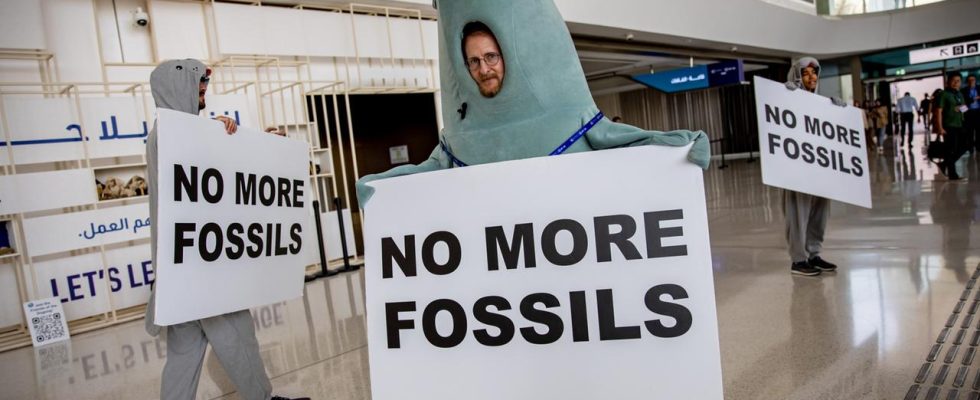At the climate conference, the participants have not yet managed to agree on a common decision. The biggest sticking point is the exit from fossil fuels. But there are others.
“Climate Justice Now”: Activists from “Fridays for Future” spoke loudly on the grounds of the World Climate Conference in Dubai this morning. They demand climate justice, now.
But if only it were that easy. Around 200 countries are currently negotiating in Dubai. You have to work out a resolution that everyone can support: from the small Pacific island that is in danger of going under, to the big coal users India and China, or the OPEC oil states, to the climate protection ambitious Europeans who are trying to switch to sustainable economic activity with a lot of money . Achieving unanimity is difficult.
Yesterday, UN Secretary-General António Guterres once again formulated the three main goals of COP28: “We need a clear plan for tripling renewables, doubling energy efficiency and a focus on the main culprits of the climate crisis: the production and consumption of fossil energies.”
Agree on some points
It is now becoming apparent that tripling renewable energies and doubling energy efficiency by 2030 are widely supported and will probably go through. The issues also appear in COP28 President Sultan Ahmed Al-Jaber’s draft decision.
The real challenge is to gradually say goodbye to fossil fuels. The draft text currently available does not commit to this. The exit from oil and gas production is mentioned as one of many possible options because oil producing countries such as Saudi Arabia in particular fear for their income.
How to take the oil-producing countries with you?
“You can say that, after all the debates that have taken place here, this is almost a provocation,” complains State Secretary in the German Development Ministry, Jochen Flasbarth. “If Saudi Arabia is the first country to say that it is basically very satisfied with the text, then that actually speaks volumes.”
The problem for Germany and Europe is that the negotiators have so far been unable to explain how they want to bring the oil-producing countries on board. Isolating and building pressure seems to be the strategy. After all, the Europeans say that a large majority of countries are in favor of phasing out fossils.
Different speeds as a bridge?
However, it’s not just the oil producing countries that are taking a stand. India and China also point out that a quick coal phase-out is not possible for them.
A bridge could be different speeds, says Martin Kaiser from Greenpeace: “There needs to be a good discussion with China and India about how the coal phase-out can be organized. And then you also have to agree with the countries that are not in the G20 and that are not The big issuers count, signal that they actually have a little more time for this restructuring.”
Differences in technical solutions
Money is of course also an issue: poorer countries are demanding help in order to be able to finance their energy transition and climate protection. Europe and the USA are big donors and Germany announced additional funding in Dubai. But the western industrialized countries also want China and the oil states to pay to the poorer states.
And finally, it is also about technical solutions to reduce greenhouse gases. The OPEC countries, but also the USA and China, rely on CO2 capture and storage, known as CCS. The Europeans, on the other hand, do not believe that much progress can be achieved with this.
So there are a lot of building blocks that have to be put together in a final paper. Everyone is now eagerly awaiting the next draft text from COP28 President Al-Jaber.
Martin Polansky, ARD Berlin, currently Dubai, tagesschau, December 12, 2023 12:00 p.m

